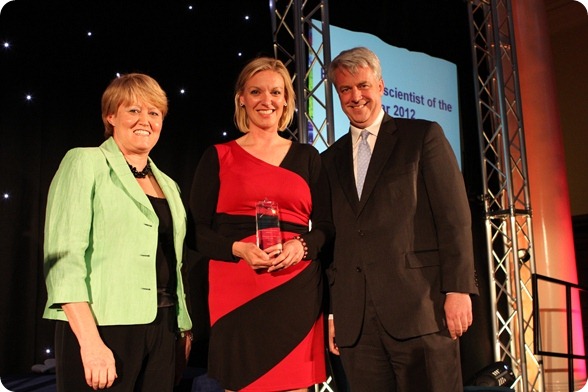May 8 2012
A Sheffield scientist who has helped change the way IVF treatment is carried out across the country has been named Healthcare Scientist of the Year.
Rachel Cutting, Principal Embryologist at the Assisted Conception Unit at Sheffield Teaching Hospitals NHS Foundation Trust, was given the award by Health Secretary Andrew Lansley at the Chief Scientific Officer’s Healthcare Science event last week.
The Healthcare Scientist of the Year award is granted annually by the Department of Health as part of an award scheme that recognises outstanding individual achievement within the health service. The winners are selected annually by the Chief Scientific Officer, Professor Sue Hill OBE.

The award recognises in particular Rachel’s uncompromising commitment to a project called ‘One at a time’, which promotes single embryo transfer during IVF treatment. The award also acknowledged Rachel’s outstanding leadership, and her dedication to teamwork and promoting better outcomes for patients.
Rachel, who has worked in assisted conception in Sheffield since 1994, said: “It was a wonderful surprise to be awarded Healthcare Scientist of the year at the awards. It recognises the work of the ‘One at a time’ project, which promotes patient safety by reducing multiple pregnancies.
“Whilst I received the award, it reflects the hard work done by many dedicated people who I am fortunate to work alongside and I would like to thank my colleagues for all the support they have given me.”
The ‘One at a time’ project has focused on improving patient safety by promoting single embryo transfer for mothers undergoing IVF treatment. The biggest single risk factor for mothers and babies following fertility treatment is multiple births, which lead to higher mortality rates. Approximately one in four treatment pregnancies are a multiple pregnancy compared to one in 80 for women who conceive naturally.
Looking at evidence from other European countries, Rachel led a project to develop national guidelines recommending the use of only one embryo at a time, publishing a paper in the leading journal Human Fertility in 2009, which has changed the way in which embryologists practice across the across the country.
Rachel also ensured that the Sheffield Assisted Conception Unit pioneered single embryo transfer, improving the safety of patients in the city. The unit now carries out around 700 procedures every year, with 60% requiring just one embryo transfer.
Single embryo transfer at the unit now has a very similar success rate to double embryo transfer, but with a much lower chance of multiple pregnancy.
Rachel continued: “It is often a concern of patients that having just one embryo transfer will reduce their chances of pregnancy. However, by improving the way we carry out single embryo transfers, we’ve been able to drive up success rates at the same time as improving safety for our patients. I am very glad that this is becoming standard practice across the country.”
Aside from her role at Sheffield Teaching Hospitals, Rachel is Chair of the Association of Clinical Embryologists.